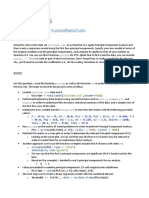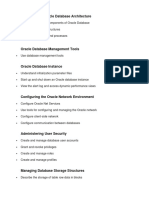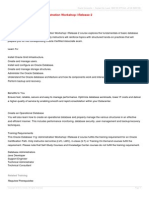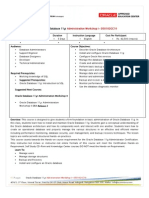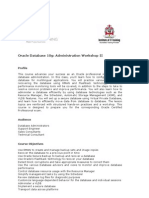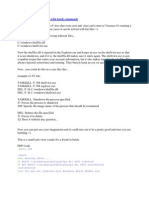0 ratings0% found this document useful (0 votes)
58 viewsTraining Topics
Training Topics
Uploaded by
krishna.setwinThe document outlines a training course on Oracle database administration that covers topics such as Oracle database architecture, installation, configuration, backup and recovery, performance tuning, and security administration. It includes sections on installing Oracle software, creating and managing databases, configuring the network environment, managing storage and users, backup and recovery, maintenance, and upgrading Oracle databases.
Copyright:
© All Rights Reserved
Available Formats
Download as DOCX, PDF, TXT or read online from Scribd
Training Topics
Training Topics
Uploaded by
krishna.setwin0 ratings0% found this document useful (0 votes)
58 views5 pagesThe document outlines a training course on Oracle database administration that covers topics such as Oracle database architecture, installation, configuration, backup and recovery, performance tuning, and security administration. It includes sections on installing Oracle software, creating and managing databases, configuring the network environment, managing storage and users, backup and recovery, maintenance, and upgrading Oracle databases.
Original Description:
Important DBA tasks
Copyright
© © All Rights Reserved
Available Formats
DOCX, PDF, TXT or read online from Scribd
Share this document
Did you find this document useful?
Is this content inappropriate?
The document outlines a training course on Oracle database administration that covers topics such as Oracle database architecture, installation, configuration, backup and recovery, performance tuning, and security administration. It includes sections on installing Oracle software, creating and managing databases, configuring the network environment, managing storage and users, backup and recovery, maintenance, and upgrading Oracle databases.
Copyright:
© All Rights Reserved
Available Formats
Download as DOCX, PDF, TXT or read online from Scribd
Download as docx, pdf, or txt
0 ratings0% found this document useful (0 votes)
58 views5 pagesTraining Topics
Training Topics
Uploaded by
krishna.setwinThe document outlines a training course on Oracle database administration that covers topics such as Oracle database architecture, installation, configuration, backup and recovery, performance tuning, and security administration. It includes sections on installing Oracle software, creating and managing databases, configuring the network environment, managing storage and users, backup and recovery, maintenance, and upgrading Oracle databases.
Copyright:
© All Rights Reserved
Available Formats
Download as DOCX, PDF, TXT or read online from Scribd
Download as docx, pdf, or txt
You are on page 1of 5
Linux training
Linux install and linux basics
Oracle DBA Training
Exploring the Oracle Database Architecture
Oracle Database Architecture Overview
Oracle ASM Architecture Overview
Process Architecture
Memory structrues
Logical and physical storage structures
ASM storage components
Installing your Oracle Software
Tasks of an Oracle Database Administrator
Tools Used to Administer an Oracle Database
Installation: System Requirements
Oracle Universal Installer (OUI)
Installing Oracle Grid Infrastructure
Installing Oracle Database Software
Silent Install
Creating an Oracle Database
Planning the Database
Using the DBCA to Create a Database
Password Management
Creating a Database Design Template
Using the DBCA to Delete a Database
Managing the Oracle Database Instance
Start and stop the Oracle database and components
Use Oracle Enterprise Manager
Access a database with SQLPlus
Modify database installation parameters
Describe the stages of database startup
Describe database shutdown options
View the alert log
Access dynamic performance views
Configuring the Oracle Network Environment
Use Enterprise Manager to create and configure the Listener
Enable Oracle Restart to monitor the listener
Use tnsping to test Oracle Net connectivity
Identify when to use shared servers and when to use dedicated servers
Managing Database Storage Structures
Storage Structures
How Table Data Is Stored
Anatomy of a Database Block
Space Management in Tablespaces
Tablespaces in the Preconfigured Database
Actions with Tablespaces
Oracle Managed Files (OMF)
Administering User Security
Database User Accounts
Predefined Administrative Accounts
Benefits of Roles
Predefined Roles
Implementing Profiles
Managing Data Concurrency
Data Concurrency
Resolving Lock Conflicts
Deadlocks
Managing Undo Data
Data Manipulation
Transactions and Undo Data
Undo Data Versus Redo Data
Configuring Undo Retention
Implementing Oracle Database Auditing
Describe DBA responsibilities for security
Enable standard database auditing
Specify audit options
Review audit information
Maintain the audit trail
Backup and Recovery Concepts
Statement Failure
User Error
Understanding Instance Recovery
Phases of Instance Recovery
Using the MTTR Advisor
Media Failure
Archive Log Files
Performing Database Backups
Backup Solutions: Overview
Oracle Secure Backup
User-Managed Backup
Terminology
Recovery Manager (RMAN)
Configuring Backup Settings
Backing Up the Control File to a Trace File
Monitoring the Flash Recovery Area
Performing Database Recovery
Opening a Database
Data Recovery Advisor
Loss of a Control File
Loss of a Redo Log File
Data Recovery Advisor
Data Failures
Listing Data Failures
Data Recovery Advisor Views
Database Maintenance
Manage optimizer statistics
Manage the Automatic Workload Repository (AWR)
Use the Automatic Database Diagnostic Monitor (ADDM)
Describe and use the advisory framework
Set alert thresholds
Use server-generated alerts
Use automated tasks
Performance Management
Performance Monitoring
Managing Memory Components
Enabling Automatic Memory Management (AMM)
Automatic Shared Memory Advisor
Using Memory Advisors
Dynamic Performance Statistics
Troubleshooting and Tuning Views
Invalid and Unusable Objects
Using the RMAN Recovery Catalog
Tracking and Storing Backup Information
Setting up a Recovery Catalog
Recording Backups
Using RMAN Stored Scripts
Managing the Recovery Catalog (Backup, Export, Import, Upgrade, Drop and Virtual Private Catalog)
Configuring Backup Settings
Configuring and Managing Persistent Settings for RMAN
Configuring Autobackup of Control File
Backup optimization
Advanced Configuration Settings: Compressing Backups
Configuring Backup and Restore for Very Large Files (Multisection)
Performing Flashback Database
Configuring Flashback Database
Performing Flashback Database Operations
Monitoring Flashback Database
Moving Data
Describe ways to move data
Create and use directory objects
Use SQL*Loader to move data
Use external tables to move data
General architecture of Oracle Data Pump
Use Data Pump export and import to move data
Duplicating a Database
Purpose and Methods of Cloning a Database
Using RMAN to Create a Duplicate Database
Cloning a Database from a Backup
Duplicate a Database Based on a Running Instance
Targetless Duplicating a Database
Upgrading a Database
upgrade a Database
Patch the database
Patch a Database
Interview preparation
You might also like
- Caught YaDocument1 pageCaught YaHector Sanchez0% (1)
- Homework #6: Student: Mario PerezDocument8 pagesHomework #6: Student: Mario Perezkrishna.setwinNo ratings yet
- Oracle DBA Workshop IIDocument4 pagesOracle DBA Workshop IIpgupta101No ratings yet
- OCA Oracle Database 11g Database Administration I: A Real-World Certification GuideFrom EverandOCA Oracle Database 11g Database Administration I: A Real-World Certification GuideRating: 4 out of 5 stars4/5 (1)
- User Guide Syneto Os 4.4.0Document282 pagesUser Guide Syneto Os 4.4.0luigiNo ratings yet
- Higher Nationals in Computing: Unit 2: Networking AssignmentDocument50 pagesHigher Nationals in Computing: Unit 2: Networking AssignmentNguyen Hoang Long (FGW HCM)No ratings yet
- Oracle DBA SyllabusDocument8 pagesOracle DBA SyllabusanilpalacherlaNo ratings yet
- Oracle DBA Training in ChennaiDocument10 pagesOracle DBA Training in ChennaiTrain TNo ratings yet
- Exploring The Oracle Database ArchitectureDocument3 pagesExploring The Oracle Database ArchitectureBasant GuptaNo ratings yet
- Oracle Database 10g Administration Workshop II Release 2Document5 pagesOracle Database 10g Administration Workshop II Release 2vsrao74No ratings yet
- Oracle Workshop 1 SyllabusDocument3 pagesOracle Workshop 1 SyllabusAnonymous RyqwFMMuJMNo ratings yet
- Oracle Database 11g: Administration Workshop I DBA Release 2Document5 pagesOracle Database 11g: Administration Workshop I DBA Release 2Feleke AfeworkNo ratings yet
- Oracle Database 10g: Administration Workshop II Release 2: DurationDocument5 pagesOracle Database 10g: Administration Workshop II Release 2: DurationadiseshupNo ratings yet
- Oracle DBADocument6 pagesOracle DBAHemanath TadiNo ratings yet
- Exploring The Oracle Database ArchitectureDocument5 pagesExploring The Oracle Database ArchitectureThuan DangNo ratings yet
- Oracle Database 11gDocument7 pagesOracle Database 11gVishy AnandNo ratings yet
- Exploring The Oracle Database ArchitectureDocument4 pagesExploring The Oracle Database ArchitectureNguyễnXuânLươngNo ratings yet
- Oracle Database 12c Admin, Install and Upgrade Accelerated - D79027GC10 - 1080544 - USDocument6 pagesOracle Database 12c Admin, Install and Upgrade Accelerated - D79027GC10 - 1080544 - USJinendraabhiNo ratings yet
- Oracle Database 12c Admin Install and Upgrade Accelerated NEW D79027GC10Document6 pagesOracle Database 12c Admin Install and Upgrade Accelerated NEW D79027GC10vineetNo ratings yet
- Oracle 11g DBA PLSQL LINUX Course ContentDocument12 pagesOracle 11g DBA PLSQL LINUX Course Contentsaravanand1983No ratings yet
- Oracle Database 10 G: Administration Workshop I Release 2: What You Will LearnDocument8 pagesOracle Database 10 G: Administration Workshop I Release 2: What You Will LearngdbhootNo ratings yet
- OCM Certification Exam TopicDocument3 pagesOCM Certification Exam TopicBalaji JayaramanNo ratings yet
- Oracle Database 12c Administration Workshop D78846GC10Document5 pagesOracle Database 12c Administration Workshop D78846GC10bugzbinnyNo ratings yet
- Oracle Database 11g Administration Workshop I Release 2 - D50102GC20 - 1080544 - USDocument5 pagesOracle Database 11g Administration Workshop I Release 2 - D50102GC20 - 1080544 - USJinendraabhiNo ratings yet
- Server ConfigurationDocument3 pagesServer Configurationjhonsirin0% (1)
- Oracle Database 11g - Administration Workshop IIDocument5 pagesOracle Database 11g - Administration Workshop IIsonicefuNo ratings yet
- Oracle 10g Admin 1Document4 pagesOracle 10g Admin 1Syed Oneeb JafriNo ratings yet
- Oracle DBA 11g@Training@DBA School HyderabadDocument10 pagesOracle DBA 11g@Training@DBA School HyderabadpsdbaNo ratings yet
- D50079GC20 1080544 UsDocument5 pagesD50079GC20 1080544 Uspriya_psalmsNo ratings yet
- Oracle Database 11g-Administration Workshop I - D50102GC10Document3 pagesOracle Database 11g-Administration Workshop I - D50102GC10kbr63No ratings yet
- Oracle DBA Training PDFDocument6 pagesOracle DBA Training PDFsoftsystrainingNo ratings yet
- Oracle Database 12c Backup and Recovery Workshop Ed 2Document6 pagesOracle Database 12c Backup and Recovery Workshop Ed 2Manuel Elizalde100% (1)
- Oracle Database 10g Administration Workshop IIDocument3 pagesOracle Database 10g Administration Workshop IIskbiswal2007No ratings yet
- Oracle Database 12c Data Guard Administration - D79232GC10 - 1080544 - USDocument5 pagesOracle Database 12c Data Guard Administration - D79232GC10 - 1080544 - USJinendraabhiNo ratings yet
- GDocument7 pagesGCyro BezerraNo ratings yet
- D78846GC20 PDFDocument5 pagesD78846GC20 PDFBugz BinnyNo ratings yet
- Oracle Database 11g Data Guard Administration Release 2 - D52161GC30 - 1080544 - USDocument4 pagesOracle Database 11g Data Guard Administration Release 2 - D52161GC30 - 1080544 - USJinendraabhiNo ratings yet
- Oracle Database 11g - Underground Advice for Database Administrators: Beyond the basicsFrom EverandOracle Database 11g - Underground Advice for Database Administrators: Beyond the basicsNo ratings yet
- Oracle DBADocument25 pagesOracle DBAAvinash SinghNo ratings yet
- Oracle DBA Course DetailsDocument9 pagesOracle DBA Course DetailsRudra MitraNo ratings yet
- Oracle Database 11g: New Features For Administrators: Installation and Upgrade EnhancementsDocument2 pagesOracle Database 11g: New Features For Administrators: Installation and Upgrade EnhancementsloadingxpNo ratings yet
- Oracle Database 12c - Administration Workshop Ed 2Document6 pagesOracle Database 12c - Administration Workshop Ed 2AjinkyaSoitkar100% (1)
- Oracle Rac & GridDocument6 pagesOracle Rac & GridDheeraj SinghNo ratings yet
- Oracle Database 12c Administration Workshop Ed 2Document7 pagesOracle Database 12c Administration Workshop Ed 2Nasir AliNo ratings yet
- Oracle Database 11g Administration Workshop II Release 2 - D50079GC20 - 1080544 - USDocument5 pagesOracle Database 11g Administration Workshop II Release 2 - D50079GC20 - 1080544 - USJinendraabhiNo ratings yet
- Oracle 11g2 TocDocument3 pagesOracle 11g2 TocThota Mahesh DbaNo ratings yet
- Training Plan Oracle DBADocument6 pagesTraining Plan Oracle DBArishijsrivastavaNo ratings yet
- Oracle Database 11g: New Features For Administrators DBA Release 2Document5 pagesOracle Database 11g: New Features For Administrators DBA Release 2mihir_karmakarNo ratings yet
- Dba Course ContentDocument6 pagesDba Course ContentDominic SavioNo ratings yet
- Oracle Database Performance Tuning SyllabusDocument5 pagesOracle Database Performance Tuning SyllabusalvinbahtiarNo ratings yet
- D78850GC10 28 UsDocument5 pagesD78850GC10 28 UsvineetNo ratings yet
- Oracle Database 12c Administration Workshop Ed 2Document6 pagesOracle Database 12c Administration Workshop Ed 2Adonis Prince NaniNo ratings yet
- Oracle Database 12c Fundamentals For Developers and System Administrators NEW D79228GC10Document4 pagesOracle Database 12c Fundamentals For Developers and System Administrators NEW D79228GC10vineetNo ratings yet
- IIHT Oracle DBADocument14 pagesIIHT Oracle DBAAjay GuptaNo ratings yet
- Oracle DBA Online Training From Skilled Professionals - Oracle Database Administration Online CourseDocument3 pagesOracle DBA Online Training From Skilled Professionals - Oracle Database Administration Online CourseTejaAcutesoftNo ratings yet
- Oracle Database 11g New Features For Administrators DBA Release 2 - D50081GC20 - 1080544 - USDocument5 pagesOracle Database 11g New Features For Administrators DBA Release 2 - D50081GC20 - 1080544 - USJinendraabhiNo ratings yet
- Oracle Database 12c R2: Administration Workshop Ed 3: DurationDocument6 pagesOracle Database 12c R2: Administration Workshop Ed 3: DurationBugz Binny100% (1)
- Oracle ExadataDocument6 pagesOracle ExadataAakash MehndirattaNo ratings yet
- Oracle Core DBADocument5 pagesOracle Core DBAkrrishsoft071No ratings yet
- Oracle Exadata Database Machine: Implementation and AdministrationDocument5 pagesOracle Exadata Database Machine: Implementation and AdministrationcaetanaNo ratings yet
- RAC ImpDocument4 pagesRAC ImpSafinaNo ratings yet
- Oracle Database 12c Backup and Recovery Survival Guide: A comprehensive guide for every DBA to learn recovery and backup solutionsFrom EverandOracle Database 12c Backup and Recovery Survival Guide: A comprehensive guide for every DBA to learn recovery and backup solutionsNo ratings yet
- Library Library Library Library Set - Seed: (Outliers) (Dplyr) (Ggpubr) (Knitr)Document23 pagesLibrary Library Library Library Set - Seed: (Outliers) (Dplyr) (Ggpubr) (Knitr)krishna.setwinNo ratings yet
- PostgreSQL - Replication Progress Tracking PDFDocument1 pagePostgreSQL - Replication Progress Tracking PDFkrishna.setwinNo ratings yet
- Pgcrypto Avast!: A Study in Django's Password HashersDocument52 pagesPgcrypto Avast!: A Study in Django's Password Hasherskrishna.setwinNo ratings yet
- Chapter 47. Background Worker Processes: WarningDocument3 pagesChapter 47. Background Worker Processes: Warningkrishna.setwinNo ratings yet
- Safari - Oct 22, 2017 at 9:11 AMDocument1 pageSafari - Oct 22, 2017 at 9:11 AMkrishna.setwinNo ratings yet
- PostgreSQL Logical Decoding PDFDocument1 pagePostgreSQL Logical Decoding PDFkrishna.setwinNo ratings yet
- How To Buy A Duplex Ebook PDFDocument21 pagesHow To Buy A Duplex Ebook PDFkrishna.setwin100% (1)
- Important 19c New FeatureDocument2 pagesImportant 19c New Featurekrishna.setwinNo ratings yet
- Blue Dart Holiday ListDocument12 pagesBlue Dart Holiday Listkrishna.setwinNo ratings yet
- Displaying State Change and Message Creation Time For Each Capture ProcessDocument3 pagesDisplaying State Change and Message Creation Time For Each Capture Processkrishna.setwinNo ratings yet
- Oracle® Database Patch 22243551 - Database Patch For Engineered Systems and DB In-Memory 12.1.0.2Document10 pagesOracle® Database Patch 22243551 - Database Patch For Engineered Systems and DB In-Memory 12.1.0.2Thiago MedeirosNo ratings yet
- Chapter 4 - Secondary StorageDocument49 pagesChapter 4 - Secondary StorageSyairah AhmadNo ratings yet
- Oracle DBA Interview Questions Experienced CandidateDocument6 pagesOracle DBA Interview Questions Experienced CandidateVenkateswarlu JaddaNo ratings yet
- Fortran 2008Document9 pagesFortran 2008iotcsiotNo ratings yet
- Assignment CISDocument7 pagesAssignment CISTashfeen AhmedNo ratings yet
- Questions You Should Always Ask About Stripcamfun Ebony Webcams Before Buying ItDocument2 pagesQuestions You Should Always Ask About Stripcamfun Ebony Webcams Before Buying ItkenseyttptNo ratings yet
- Adsp 2186Document36 pagesAdsp 2186jhon simsNo ratings yet
- T2 Worksheet 2Document5 pagesT2 Worksheet 2arushi.aguptaNo ratings yet
- Software Development Life Cycel (AA)Document49 pagesSoftware Development Life Cycel (AA)MugenLensrichNo ratings yet
- Data Cloud and Infrastructure - Project ReportDocument20 pagesData Cloud and Infrastructure - Project ReportShravya ShivaramNo ratings yet
- Guide Progiciel GOLDDocument147 pagesGuide Progiciel GOLDiibourk.houssineNo ratings yet
- SGBAU - ENGINEERING (Winter-2024)Document17 pagesSGBAU - ENGINEERING (Winter-2024)kediagaurav54No ratings yet
- NET Sample Resume 1Document3 pagesNET Sample Resume 1ashaNo ratings yet
- Peru Telecom Operators Country Intelligence ReportDocument4 pagesPeru Telecom Operators Country Intelligence Reportphuonganh.hrworkNo ratings yet
- Credential HarvestingDocument18 pagesCredential Harvestingwaraxe23No ratings yet
- Manuel de Oliveira Lima - Cousas DiplomáticasDocument301 pagesManuel de Oliveira Lima - Cousas DiplomáticasGuilhermePöttkerNo ratings yet
- 1.jumio IDVerificationDatasheet v7Document2 pages1.jumio IDVerificationDatasheet v7Pedro SanchezNo ratings yet
- Make Your Own Anti Virus With Batch CommandsDocument2 pagesMake Your Own Anti Virus With Batch CommandsSunday AdebiyiNo ratings yet
- Operations On ProcessesDocument7 pagesOperations On ProcessesAnushkaNo ratings yet
- Akamai How To Mitigate The Owasp Top 10 RisksDocument12 pagesAkamai How To Mitigate The Owasp Top 10 RisksNguyễn Đức AnhNo ratings yet
- 10.secret Communication Through Audio For Defense ApplicatioDocument5 pages10.secret Communication Through Audio For Defense ApplicatioJack SabarNo ratings yet
- CompTIA SY0-501 Dumps - Secret To Pass in First AttemptDocument7 pagesCompTIA SY0-501 Dumps - Secret To Pass in First Attemptcristopherdeen40% (5)
- Ap450 Iis005 Interface Wms To Sap v1.1Document10 pagesAp450 Iis005 Interface Wms To Sap v1.1nstomarNo ratings yet
- Dashboards Are Dead 3 Years Later by Taylor Brownlow Towards Data ScienceDocument15 pagesDashboards Are Dead 3 Years Later by Taylor Brownlow Towards Data SciencemadoslomNo ratings yet
- Coursera WXTKTQGULYKN PDFDocument1 pageCoursera WXTKTQGULYKN PDFUmer farooqNo ratings yet
- Ui Ux DesignerDocument14 pagesUi Ux DesignerGaurika VermaNo ratings yet
- The Outbox Pattern: One of My Previous ArticlesDocument11 pagesThe Outbox Pattern: One of My Previous ArticlesAdolfNo ratings yet

